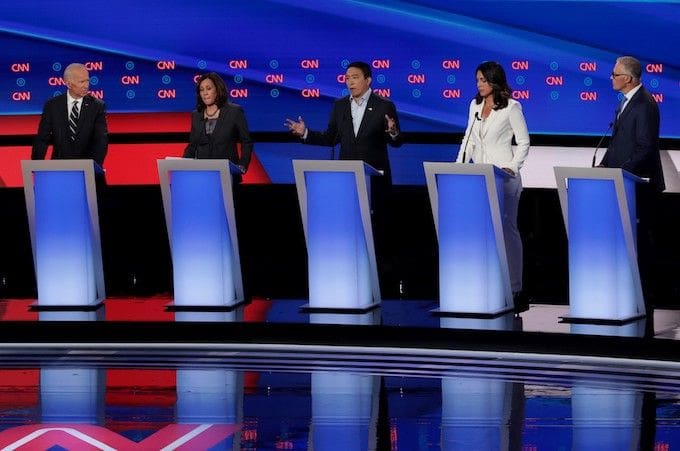Andrew Yang’s plan to provide $1,000 in government-sponsored payments to every American adult each month — an “allowance for grown-ups,” as some have called it — is being touted as a big, bold idea. It’s not without criticism, however, as others have claimed that this type of universal basic income might incentivize people not to look for work.
Yang counters by saying that people will still be incentivized to get jobs and contribute to the economy — that $12,000 per year is still not enough for most people, and that it is instead a catalyst that will spur people to want to do more. But there is something more to it that even Yang himself may not be seeing the magnitude of, or if he does, may not be placing enough salience on: It is his way of giving everyone the startup capital they need for their “Startup of Me.”
I believe Yang came to this understanding a long time ago. Universal basic income is not a recent revelation of his, nor a big, bold idea. It need not be. Yang already started a dress rehearsal of the plan years ago. And whether he knows it or not, it has already had ripple effects.
Yang and I met almost seven years ago. We were on a judging panel together at a startup pitch competition where a grand prize of $10,000 would be awarded to whomever we decided was the top entrepreneur (actually, to be precise, $9,000 was awarded to the winner, and $1,000 was awarded based on the “audience favorite.”) After listening to all the pitches, all eight of the judges, including Yang and myself, went backstage to deliberate.
Second chances are one of the biggest hurdles for those who are disadvantaged. They just don’t receive them.
For whatever reason, there was a quick consensus amongst six of the judges on who the winner should be — an artisanal beverage company. But two judges — Yang and myself — found a different startup to be far more compelling, a company with a mission to improve philanthropic capital allocation through research and analysis. After quite a bit of discussion among the judges, it was clear that we were not going to reach a unanimous decision. Yang and I continued to feel that the latter company was the most deserving of the prize, and at one point Yang leaned over to me and whispered, “What if you and I both put in $1,000 on our own to help this founder get his feet off the ground?”
Yang was already thinking in terms of what $1,000 could do for someone, even back then. But it wasn’t about the money. For Yang, it was just as much about the founder of that company, and making sure he knew that even though he may not have won the grand prize, he still had another chance.
As I’ve come to see, in both the academic research that I’ve since conducted and in the stories that I’ve heard from people in the writing of my upcoming book, it’s about these second chances and a belief in them — even as we know that the world is not fair and that second chances are not distributed or allotted equally.
Second chances are one of the biggest hurdles for those who are disadvantaged. They just don’t receive them. Part of what is embroiled in disadvantage is that you don’t get to take as many risks — that not everyone “gets” the same number of chances to fail. If you’re a Black woman and someone takes a chance on you, the expectation is that you deliver; that you prove yourself. If you don’t deliver, you often don’t get another chance. So there is less willingness to take chances.
We gloss over the fact that failure impacts people differently, and that some people have the privilege to fail more than others.
I’ve seen it play out similarly for many of my low-income, first-generation students. As a society, we advocate that failure is okay — even that failure is essential to success. I have certainly taught that in my entrepreneurship classes. In the entrepreneurship ecosystem, we see it all the time. Venture capitalists, angel investors love failed entrepreneurs. They feel like there is some tacit knowledge that entrepreneurs have gained through their failures, something important that they have learned because they’ve done it before. And it’s probably true.
But we gloss over the fact that failure impacts people differently, and that some people have the privilege to fail more than others. Those who cannot afford to fail a class because of the extra tuition that it would cost. Those who don’t have parental wealth to fall back on. Failure, in this way, is a privilege. For those who are privileged get many chances to fail. The effects of failure aren’t the same for everyone. For people who are marginalized in any way, failure has the potential to reinforce every negative image, bias, or stereotype they are facing.
Someone once explained it to me in such a powerful way that I’ve never been able to forget this analogy: Picture one of those carnival games where you throw darts at balloons to win a prize. Middle-class kids, for example, can afford one throw. Most miss. A few hit the target and get a small prize. A very few hit the center bullseye and get a bigger prize. We make these people into heroes, allowing lots of other kids to think that they too have the opportunity to hit the bull’s-eye — but in doing so, essentially give the impression that it is something easier to do than it actually is.
Rich kids can afford many throws. If they want to, they can try over and over and over again until they hit something and feel good about themselves. Some keep going until they hit the center bull’s-eye, and then they talk about how failure is essential to success, and how hard work and persistence reign prime.
Oh, and poor kids? Poor kids aren’t visiting the carnival and given a chance to throw. They’re the ones working it.
But give each kid 12 darts and a chance? Or give each person $1,000 each month? Watch what happens.
That’s what I got to see since meeting Yang for the first time seven years ago. He did go on to give that company $1,000. I, embarrassingly, did not, too afraid to admit to Yang that though I was a professor by that point, I still had tens of thousands of dollars in student loans still to pay off (another story entirely, though no less relevant for the upcoming election). When I finally did finish paying off my student loans not too long ago, I started investing in early-stage companies, month by month, $1,000 at a time. Many of them have achieved phenomenal results.
Yang may still be considered exceedingly unlikely to win the presidential election, and may not even last long into primary season. But the significance of his $1,000 — to me, to you, to each American adult — that is something that can’t be diminished. We all want a chance to throw some darts.
Laura Huang is an associate professor at Harvard Business School and the author of the upcoming book “Edge: Turning Adversity into Advantage” (January 2020). Follow her on Twitter @LauraHuangLA.





















